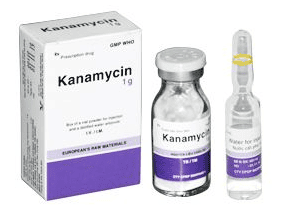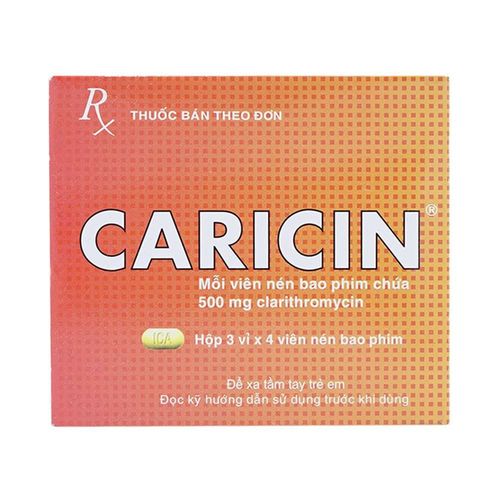This is an automatically translated article.
Rinedif 300 mg is made in the form of hard capsules, with the main ingredient being Cefdinir. It is used in the treatment of infections caused by susceptible strains of bacteria.
1. Uses of Rinedif 300 mg
What are the uses of Rinedif 300 mg? The main ingredient of the drug is Cefdinir - a 3rd generation cephalosporin antibiotic. This is a cephemide antibiotic, unaffected by beta-lactamase enzymes, with broad antibacterial activity, against both gram-negative and gram-positive bacteria. The mechanism of action of Cefdinir is to inhibit the synthesis of bacterial cell walls, thereby effectively killing bacteria.
Indications for use of Rinedif 300 mg: Treatment of infections caused by susceptible strains of bacteria:
Tonsillitis, pharyngitis; Bronchitis, acute pneumonia, exacerbations in chronic bronchitis; Genitourinary and urinary tract infections; Sinusitis, acute otitis media; Gonorrhea without complications; Obstetric and gynecological infections; Skin and soft tissue infections; Prophylaxis of postoperative infections. Contraindications to the use of Rinedif 300 mg:
People who are allergic to the drug's ingredients or to cephalosporin antibiotics.
2. Usage and dosage of Rinedif 300 mg
Usage: Orally. Rinedif 300 mg should not be taken with meals.
Dosage:
Community-acquired pneumonia: 300mg/time x 2 times/day for 10 days; Acute exacerbation of chronic bronchitis: 300mg/time x 2 times/day or 600mg/time for 10 days; Acute sinusitis: 300mg/time x 2 times/day or 600mg/time for 10 days; Pharyngitis/tonsillitis: Use a dose of 300mg/time x 2 times/day or 600mg/time, treat for 5-10 days; Dermatitis and skin structure: 300mg/time x 2 times/day, treatment for 10 days; Patients with renal failure with creatinine 30ml/min: 300m/time/day; Patients on hemodialysis: 300mg/day or 7mg/kg at the end of each dialysis session, 1 dose every other day. Missed dose: If you forget to take a dose of Rinedif 300 mg, you should take it as soon as you remember. If it is almost time for your next dose, skip the missed dose and take your next dose as scheduled.
Overdose: There is no information on overdose of Cefdinir (main ingredient of Rinedif 300 mg). Symptoms of overdose with beta-lactam antibiotics include nausea, vomiting, convulsions, diarrhea,... Hemodialysis can reduce the concentration of Cefdinir in the body. Dialysis may be used in patients with severe overdose, especially in patients with severe renal impairment.
3. Side effects of Rinedif 300 mg
When using Rinedif 300 mg, patients may experience some side effects such as:
Diarrhea, vaginal candidiasis; Abdominal pain, nausea, pseudomembranous enterocolitis Hypersensitivity reactions: Allergic in the form of rash, urticaria, itchy skin. Patients should inform their doctor about the side effects encountered when using Rinedif 300 mg for advice and appropriate advice.
4. Be careful when using Rinedif 300 mg
Before starting treatment with Cefdinir, it is necessary to carefully evaluate the patient's history of allergy to penicillins and other cephalosporins. cross-hypersensitivity among beta-lactam antibiotics). If hypersensitivity occurs, the drug should be discontinued. Severe cases of hypersensitivity require supportive treatment (using epinephrine, oxygen, corticosteroids, antihistamines); Diarrhea caused by Clostridium difficile has been reported in most cases of antibiotic use (including Cefdinir). Patients may develop mild diarrhea or pseudomembranous colitis leading to death. This is because treatment with the antibiotic Cefdinir causes an imbalance in the microflora in the colon, causing Clostridium difficile to overgrow. The supertoxins secreted by Clostridium difficile cause increased morbidity and mortality due to antibiotics, requiring colectomy. Therefore, it is advisable to monitor the patient's diarrhea during the course of taking the drug; Long-term use of Cefdinir may cause overgrowth of resistant strains of bacteria; Use caution when using Rinedif 300 mg in patients with a history of colitis; The dose of Rinedif 300 mg may need to be reduced in patients with renal impairment (with creatinine clearance less than 30 ml/min). The patient's blood and kidney function should be monitored during treatment, especially if taking the drug for a long time with high doses; Only use Rinedif 300 mg that is absolutely necessary during pregnancy and lactation, so consult your doctor before taking the drug.
5. Rinedif 300 mg drug interactions
Some drug interactions of Rinedif 300 mg include:
Concomitant use of Cefdinir (main ingredient of Rinedif 300 mg) with antacids containing aluminum or magnesium will reduce the absorption of Cefdinir. If antacids are required during Cefdinir treatment, Cefdinir should be taken at least 2 hours before or after the antacid; When Cefdinir is used together with iron or vitamin supplements, the effectiveness of Cefdinir will be reduced. Therefore, it is recommended to take Cefdinir at least 2 hours before or after taking iron, vitamin supplements,... Before using Rinedif 300 mg, patients should discuss with their doctor about the medicines they are taking. and diseases, allergic problems that you have for timely advice.
Rinedif medicine 300 mg is made in the form of hard capsules, with the main ingredient being Cefdinir. It is used in the treatment of infections caused by susceptible strains of bacteria. To ensure the effectiveness of treatment and avoid unwanted side effects, patients need to take the drug according to the prescription and consult a doctor, a specialist pharmacist.
Follow Vinmec International General Hospital website to get more health, nutrition and beauty information to protect the health of yourself and your loved ones in your family.
Please dial HOTLINE for more information or register for an appointment HERE. Download MyVinmec app to make appointments faster and to manage your bookings easily.













